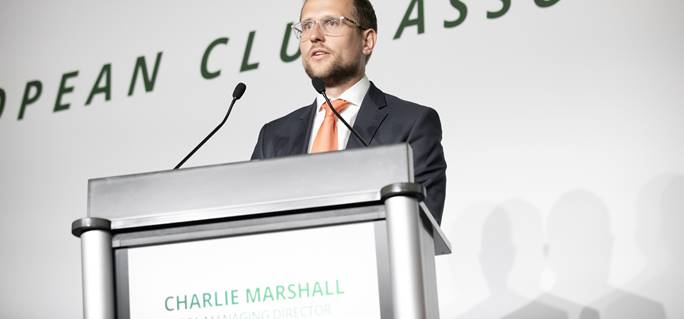
Since its creation, ECA has attached significant importance to its relations with Public Authorities and in particularly the EU. To ensure that the European clubs' voice is heard and considered in the development of EU Sports Policy, ECA has proactively sought to build strong relations with key officials and politicians within the institutions that make up the EU. Beyond sports policy itself, the EU has significant impact on the professional club game around matters relating to EU competition law and the functioning of the single market of which the free movement of workers is of particular relevance to clubs especially in relation to the transfer system.
Over the past two decades, the EU and governments from across Europe have been increasingly involving themselves in issues affecting the development of the game. With the coming into force of the Lisbon Treaty in early 2010, the EU, via Article 165 of the Treaty, has, for the first time, acquired formal powers in the area of sport. This new-found status was highlighted by the adoption of a Communication (January 2011) detailing how the European Commission intends to develop the European dimensions of sport. In its Communication, the European Commission outlines its views on a number of key issues impacting directly on the day-to-day activities of ECA Members. The EU's involvement is not only limited to the European Commission. The European Parliament is also taking a keen interest in football matters and has, in recent years, presented a number of reports expressing its views on many aspects of the game.
With this increased involvement of political bodies in football, ECA has proactively sought to engage with them to ensure that politicians and civil servants are fully aware of ECA's views on issues directly affecting European club football ahead of designing policy and legislative outcomes. Contacts at all levels of the EU are regular and ongoing. These include:
- Regular contact with European Commission civil servants and MEPs including those from the European Parliament’s Sports Group;
- Exchanges with EU Sports Commissioner Margaritis Schinas and his predecessors and Sports Ministers from across the EU;
- Regular contacts with authors of EU funded research (report on agents/report on transfer system);
- ECA participation in conferences/meetings hosted by the European Commission and European Parliament.
Outlined below, is ECA’s position in relation to a number of important topics of interest on which the EU is focused.
SOCIAL DIALOGUE
The EU Social Dialogue is a European Commission platform which allows representatives from both employees and employers of a specific industry to discuss and agree on social and labour conditions at a European Union level. The Social Dialogue for Professional Football was created in 2008, with ECA afforded the status of formal partner since its inception. Employers are represented by ECA and the European Leagues, while the employees are represented by FIFPRO. UEFA also plays a role, however not as social partner but acting in a facilitator role. ECA considers the SD in professional football as a fundamental dialogue platform which has led to landmark achievements such as the conclusion of the Autonomous Agreement and the Minimum Requirements for Standard Player Contracts in Europe back in 2012.
SPECIFICITY
ECA endorses the concept of Specificity. There is no denying that sport is unlike other sectors and therefore should be treated accordingly. Careful consideration must be given to the exact applicability of EU law to football to ensure the game can continue to develop, prosper and reach its full potential in a manner that allows it to meet its social responsibilities. This requires that EU law be applied in a balanced manner with careful consideration of its applicability on a case-by-case basis.
GOVERNANCE/AUTONOMY
ECA endorses the concept of autonomy and the need for it to apply to the organisation of sport. Governing federations should be allowed to organise themselves and promote their particular sport in accordance with the law. Public authorities such as the EU should play a guiding and facilitating role. However, this can be undertaken only in a manner which ensures that formally recognised stakeholders are involved appropriately and meaningfully within key bodies in a manner that reflects their role and contribution to sport and ensures optimal outcomes and decision-making. ECA is particularly encouraged by the European Commission and European Parliament calls to endorse autonomy on the condition that governing bodies adhere to good governance principles.
STRUCTURED DIALOGUE
ECA welcomes the emergence of a structured dialogue whereby stakeholders and policy makers can engage with one another to help develop an EU-wide sports policy. ECA believes that the EU's willingness to listen, engage and take on board the daily realities of stakeholders prior to developing policy is to be warmly welcomed and reflects well on the EU in approaching policy-making in an open, transparent and modern manner. ECA remains committed and available to offer all the support required by the EU in driving its efforts around policy and legislation impacting the professional game.
FREE MOVEMENT OF SPORTSMEN
ECA endorses the position expressed on numerous occasions by the European Commission in relation to the free movement of sportsmen. ECA opposes any rule entailing direct discrimination such as quotas of players on the basis of nationality. Where we remain open is in relation to indirect discrimination under the condition that "they pursue a legitimate objective and insofar as they are necessary and proportionate to the achievements of such an objective." However, ECA believes this must be undertaken in very special circumstances and with the specific aim of promoting youth development.
MATCH FIXING AND INTELLECTUAL PROPERTY RIGHTS
ECA believes strongly that the European Commission alongside stakeholders and IPR holders should come together to elaborate rules aimed at ensuring that IPRs belong fully to the participating clubs, leagues or federations in any particular match. Guidelines should be established to determine which matches fall under such rules. This would allow the participants in matches to license only betting organisations that can guarantee taking appropriate measures to prevent illegal behaviour when they offer bets on their matches. Creating such a system would help ease the risk of match fixing as clubs/leagues/federations would take particular care in choosing reputable betting organisations at the expense of those over which concerns may exist.
COMBATTING ONLINE PIRACY
Recent years have seen the increasing emergence of live sporting content being pirated and offered to fans through unlicensed streaming platforms. This disregard for the law prevents professional football from optimising its ability to generate revenue, which has a detrimental effect on its capacity to support efforts around the development of the game further down the pyramid. ECA, alongside numerous other sports stakeholders, continues to engage and encourage the EU to pursue all efforts in shaping a regulatory environment that will reduce the risk of piracy which, if left unchallenged, constitutes an existential threat to the game.
TRANSFER SYSTEM
The transfers of players and the system by which it operates is an integral part of club football. The current system in place is a clear example of the application of the Specificity concept whereby special rules are elaborated in relation to the transfer of workers (players) from one business (clubs) to another. ECA believes that the current system on the whole operates well and enables clubs to trade players in a manner which is appropriate for clubs, players and more generally club football as a whole. ECA believes that a watchful eye must be maintained at all times as a means to continuously assess the workings of the system and take on board the emergence of new trends. Where challenges and imperfections are identified, stakeholders directly involved in the transfer system should join forces to look at ways to improve certain aspects of the system. ECA supports an evolutionary rather than revolutionary approach in modernising the system and reiterates that the transfer system is an important mechanism in ensuring wealth redistribution whereby medium and smaller clubs can earn valuable revenue through the transferring of players.
SOCIETAL ROLE OF SPORT
The social, educational and cultural role football plays is central to the everyday activities of clubs. ECA members understand the importance and impact they have in enhancing the educational, social and health aspects of society. The impact of ECA’s activities goes well beyond the fields on which we practise our sport. ECA calls on the EU and its Member State Governments to establish a structure whereby sports stakeholders can collaborate in offering best practice to ensure that their positive impact on society can be maximised to the full.
ECA is a proud partner of the European Week of Sport. The campaign, launched in 2015 by the European Commission, aims at promoting sport and physical activity across Europe to all citizens, regardless of age, background or fitness level. This European-wide campaign inspires Europeans to #BEACTIVE during the Week and encourages them to stay active all year long. For more information: www.ec.europa.eu/sport/week.




